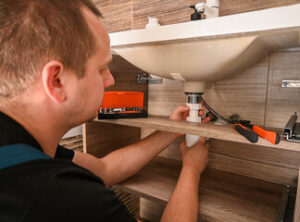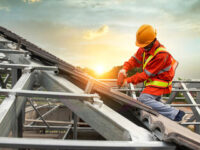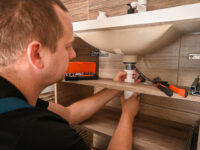What Does it Mean to Be a Plumber?
Plumbers Sarasota are skilled tradespeople who install, repair, and maintain pipes and fixtures. They work in residential, commercial, and industrial settings. They also provide 24/7 emergency services for burst pipes and severe clogs.
Plumbing systems ensure we have access to clean water for everything from washing clothes to sanitizing operating rooms. They’re considered “recession-proof” because they’re needed even when times are tough.
A reliable plumbing system provides clean water for drinking, washing, and cooking. It also prevents the spread of disease and other contaminants through clogged pipes, drains, and sewer systems. A plumber can help ensure a home’s water supply is safe by performing regular inspections and cleanings. For example, a plumber can remove rust from exposed water pipes to reduce mineral deposits and corrosive elements that may leach into the water supply. A plumber can also clear blocked drains using specialized equipment to eliminate nasty odors and prevent wastewater backups.
In addition to ensuring safe and clean drinking water, a plumber can also install and maintain filtration and purification systems in homes and businesses. This way, homeowners and business owners can enjoy healthy, clean water all the time. For instance, installing a water softener can help reduce the presence of minerals in the water and reduce the risk of waterborne illnesses.
While the EPA oversees the treatment of public water supplies, plumbers can play a crucial role in ensuring that private water supplies are free from harmful contaminants and bacteria. They can also provide advice on implementing effective water filtration and purification systems, making sure they are properly maintained to ensure optimal performance and longevity.
Plumbing is essential in hospitals and healthcare facilities, where sanitary conditions are critical for patient safety. Proper plumbing helps ensure sterile environments for surgeries, maintenance, and cleaning, as well as proper waste disposal to protect staff and patients from illness and infection. Plumbers can install and repair a wide variety of medical and hospital plumbing fixtures, including toilets, showers, taps, and drains.
Many people don’t realize that the water they drink is contaminated with chemicals, pathogens, and other pollutants. Fortunately, the EPA and municipal governments regulate the quality of drinking water to safeguard the health and safety of citizens. But the quality of a home’s water can be compromised by deteriorating or outdated pipes, which can leak or break. In such cases, it is a good idea to hire an experienced and professional plumber for pipe repairs and replacement.
Waste Disposal
A garbage disposal is a great kitchen appliance for reducing food waste. But if you put the wrong things down your disposal or leave it running when you’re not at home, your garbage disposal plumbing can become clogged and even damage your pipes. This is why plumbers recommend following proper disposal practices.
For example, putting oil or grease down the drain can create big problems. Instead, pour it into a can to cool and solidify before throwing it away. Wiping greasy pans and platters down with paper towels before washing them also helps. Plumbers can advise you on the best ways to dispose of grease and other foods that don’t belong in your plumbing system.
Similarly, your garbage disposal is not designed to handle fibrous materials like celery, onion skins or lettuce. These can tangle in the blades and jam your disposal unit. Egg shells, which don’t dissolve in water, can also build up and create smelly, clogged drains. And if you throw anything metal in your disposal, it could cause the unit to short out and spark.
A well-functioning garbage disposal is vital for a healthy home, but it’s not something you should try to fix yourself. If your disposal is leaking, making louder than usual grinding noises or shutting off unexpectedly, call a plumber right away. A plumber can diagnose any problems and repair them before they worsen.
Plumbers can also help you choose the right garbage disposal for your needs and install it correctly. They’re familiar with the different types and sizes available, so they can help you find one that matches your sink and plumbing layout. They can also explain how to use and maintain your disposal so you get the most out of it.
In addition to being able to install your disposal, plumbers can also handle the electrical wiring, which is important for ensuring the device works safely and properly. Many plumbers, including those from Haller, are skilled at both electrical and plumbing work, so they can take care of your entire installation in a single appointment. This saves you both time and money.
Safety
The safety of plumbers, as well as those who rely on their services, is an important aspect of the job. Adherence to safety protocols and guidelines minimizes risk and protects the health and wellbeing of all involved. For plumbers, this includes ensuring that personal protective equipment (PPE) is used appropriately and that hazardous materials are handled correctly. It also means being familiar with the regulations that govern work site safety, including those for confined spaces and electrical work.
The first step in ensuring plumbing workers’ safety is proper training and education in hazard identification. This teaches them to recognize potential dangers and the harm they can cause, such as chemical exposure or toxic fume inhalation. It also teaches them to assess the risks of specific situations, such as leaks or blockages, and how to deal with them.
Plumbers should also be trained in PPE use and safe working practices. This involves using appropriate gloves, eye protection, and head protection. For example, a pair of thick gloves for plumbing can protect the hands from harmful chemicals or caustic liquids, while safety goggles can shield the eyes from sparks and UV radiation. A hat or hard hat can also protect the head from falls, and slip-resistant boots can reduce the risk of injuries caused by slippery surfaces.
Hazardous materials like lead, asbestos, and mold are often found in aging pipes or buildings. Proper disposal is essential to minimizing their impact on the environment and public health. This involves understanding how to read and understand labels, safety data sheets, and other information related to the specific substances. It also involves being knowledgeable about how to store and segregate incompatible materials.
Finally, it is essential for plumbers to know how to respond to emergency situations. This requires being aware of who to call, what to do immediately, and how to document incidents. In addition, it is crucial for plumbers to be familiar with the regulations and procedures that govern worksite safety.
The work of plumbers is critical to a safe and healthy society. Without their efforts, water systems would not function properly and diseases like cholera and dysentery could spread. In emergencies, they are on the front lines of crisis response, helping to mitigate damage and provide clean water, sanitation, and other essential services.
Social Impact
In a career that involves working in the public realm, plumbers often work with people from all walks of life. They are exposed to new people daily and build relationships that can lead to future business opportunities. This is why it’s essential for plumbers to develop strong communication skills and be comfortable interacting with all types of people. The countless interactions they have with people also give them the opportunity to promote sustainable plumbing practices that can help protect their customers from health hazards.
Many industry leaders in the plumbing sector are making sustainability a key focus of their business model. They strive to improve their operations and supply chain by adopting lean-green approaches that reduce carbon footprints and minimise waste. This has helped to create a positive reputation for the industry, which is beneficial for their bottom line and for consumers in general.
As a result of their efforts, plumbing businesses are contributing significantly towards a more sustainable society and the environment. This has become even more important in the face of climate change and global warming. The industry must be at the forefront of promoting sustainable solutions and raising awareness to tackle the growing problem.
The plumbing industry is also increasingly focused on ensuring that people have access to clean water and effective waste disposal systems. These vital utilities can prevent the spread of deadly water-borne diseases. It is up to plumbers to ensure these systems are always functioning at their best and provide peace of mind for their customers.
As the world becomes more environmentally conscious, it’s critical for all industries to make sustainability a core aspect of their operations. Plumbers are no exception and can play a significant role in educating their clients on how to conserve energy and water, as well as encouraging them to switch to sustainable materials like copper.
As the global population continues to rise, the demand for efficient plumbing infrastructure is growing. This will only increase the pressure on the plumbing industry to adopt sustainable solutions. To meet this challenge, it’s crucial that plumbers undergo extra training to keep their skills up to date and stay ahead of the curve.






